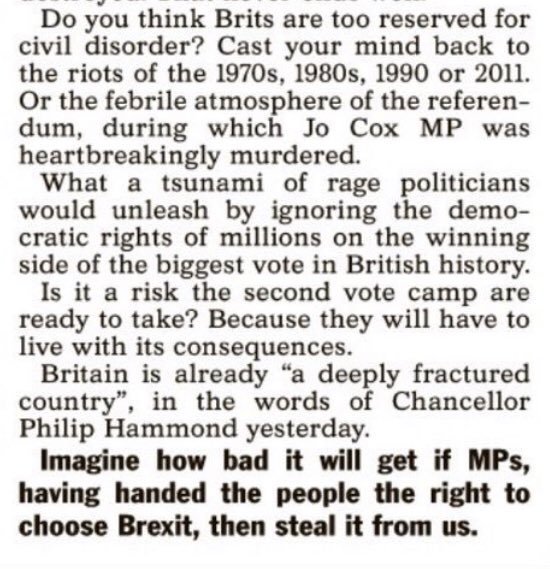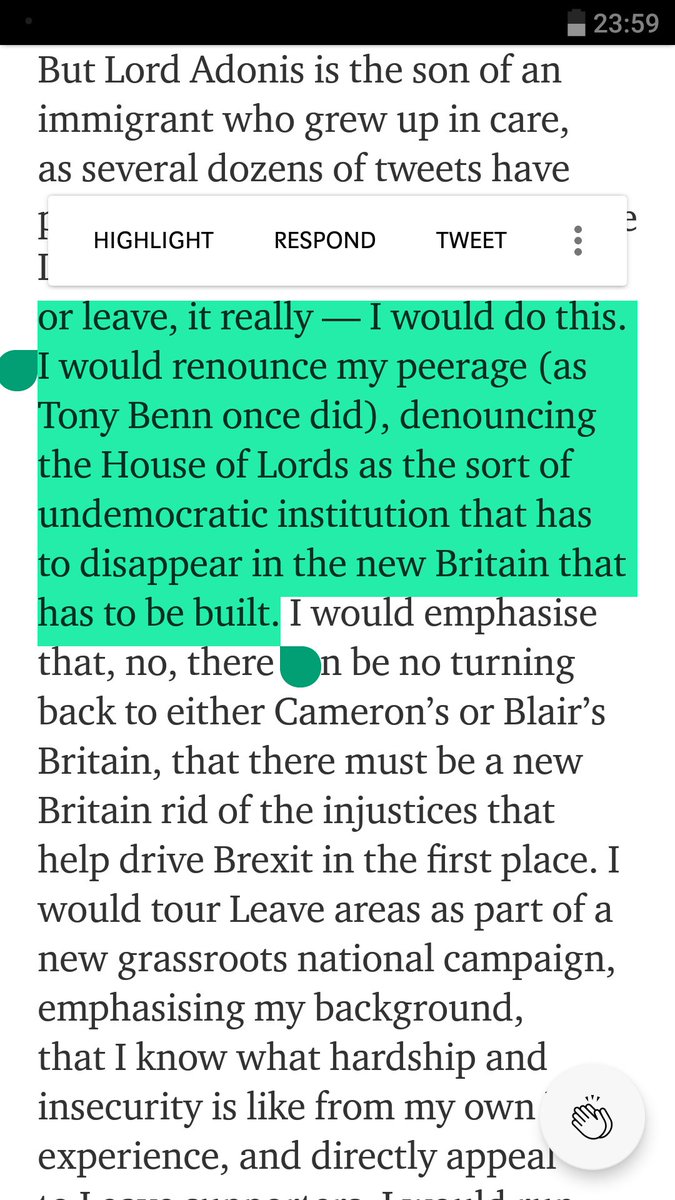1/21
#AmberRuddResigns #BrexitShambles
Describing politicians as “Leavers” or “Remainers” is loose use of language. It means at least two distinct things- which are
a) related but different
b) of importance to different groups of ppl, and
c) tell us different things about what is now going on & what is at stake.
There are important issues here that warrant discussion. But it doesn’t help to use highly ambiguous shorthand language that potentially confuses as much as it illuminates. So what does it actually mean when we talk about “Leavers” or “Remainers” in Cabinet...?
First of all “Leaver” vs “Remainer” is a historical label, with a factual basis. It has a literal meaning, which simply tells us how people campaigned/voted in the EUref. To many ppl (though not all) that is of secondary importance compared to what somebody *now* believes...
There are plenty of Tory party loyalists, including quite a few in ministerial positions, who campaigned prominently for Remain but now say stuff like, “I was a Remainer- but above all, I’m a democrat” (i.e. I now wholeheartedly support the govt’s Brexit approach).
This line (“I was a Remainer but I’m a democrat”) plays well with the party’s Brexity grassroots & with its dominant authoritarian tendency. Because it effectively means, ‘I hereby declare that I have renounced my former beliefs & can be trusted.’ It is an oath of allegiance.
However, when ppl talk about the balance of “Leavers” & “Remainers” in Cabinet, most (outside the Conservative party & their media cheerleaders) are not really talking about the historical question of how ppl voted in June 2016.
That’s not to say that it’s unimportant. There are definitely Brexit hardliners (the zealots, like Jacob Rees-Mogg, the Mail & the Telegraph) who *do* think it’s important to preserve the right balance between representatives of the two camps of how ppl voted in June 2016.
There are two reasons why these groups still attach importance to what ppl did in June 2016. Firstly, for them symbolism is important: Brexit is tribal; it’s about identity. Secondly...
... insisting that the Cabinet must have a balance of ppl who voted Leave & Remain back in 2016 *regardless of what those same ppl now think* is politically useful. It serves an agenda.
This is because public conversions have been one-way traffic. No prominent Tories say “I campaigned for Brexit but now think it was a mistake”. Insisting on keeping ‘balance’ allows double-counting; it’s a cloak of reasonableness behind which they can consolidate their grip.
But of course referring to “Leavers” or “Remainers” in Cabinet also has a different meaning, which is not so much about how ppl voted in 2016 (although there is a correlation). It is more about what *kind* of Brexit they are now pushing for.
There are those led by Johnson, Gove & Fox pushing for maximum divergence & regulatory autonomy from the EU. And there are those led by Hammond, BEIS Secretary Greg Clark & (until now) Amber Rudd- who believe that the damage from this approach outweighs any supposed benefits.
Although there is strong overlap with how ppl voted in June 2016, and what kind of Brexit they are now pursuing, it is not 100%. As I mentioned before: some ‘ex-Remainers’ have switched sides (e.g. Jeremy Hunt, Gavin Williamson).
Another important point is that those in Cabinet who are commonly described as “Remainers” (Hammond, Clark, Rudd) are -emphatically- NOT campaigning for the UK to Remain in the EU but rather to *soften* Brexit...
(However, there are plenty of paranoid conspiracy theorists in Parliament who insist that there’s no difference i.e. that those who claim to accept Brexit but who are trying to soften it are actually trying to block/undermine it.)
So using the term “Remainers” to describe those in Parliament who are trying to soften (rather than to block) Brexit is misleading because the same term also applies to those who continue to argue Brexit is a mistake and that it would be better for the UK to Remain in EU.
This is not the position of Hammond, Rudd and Clark. In public at least, they are fully signed up to the objective of leaving the EU (on the basis that the EUref result must be repeated). They are not even calling for a People’s Vote on the terms of the deal.
tl;dr I object to the lazy journalistic shorthand of calling ppl like Rudd “Remainers” because it a) conflates 2 different things & b) subliminally reinforces the ERG narrative that there is no difference between wanting to soften Brexit & “betraying the will of the people”.
More accurate & useful distinctions:
- Pragmatists vs True Believers
- Damage Limiters vs Farragutists (not to do with Farage: Admiral Farragut was the guy who said “Damn the torpedoes, full speed ahead!”
- Convergers vs Divergers
- Gravitationalists vs Gravity-Deniers
Also useful to keep the label “ex-Remainers” handy, particularly when talking about Conservative MPs/ministers. Are we talking about somebody who happened to campaign for Remain but is now fully bought into Brexit? Or somebody who still thinks it’s a terrible idea?//










